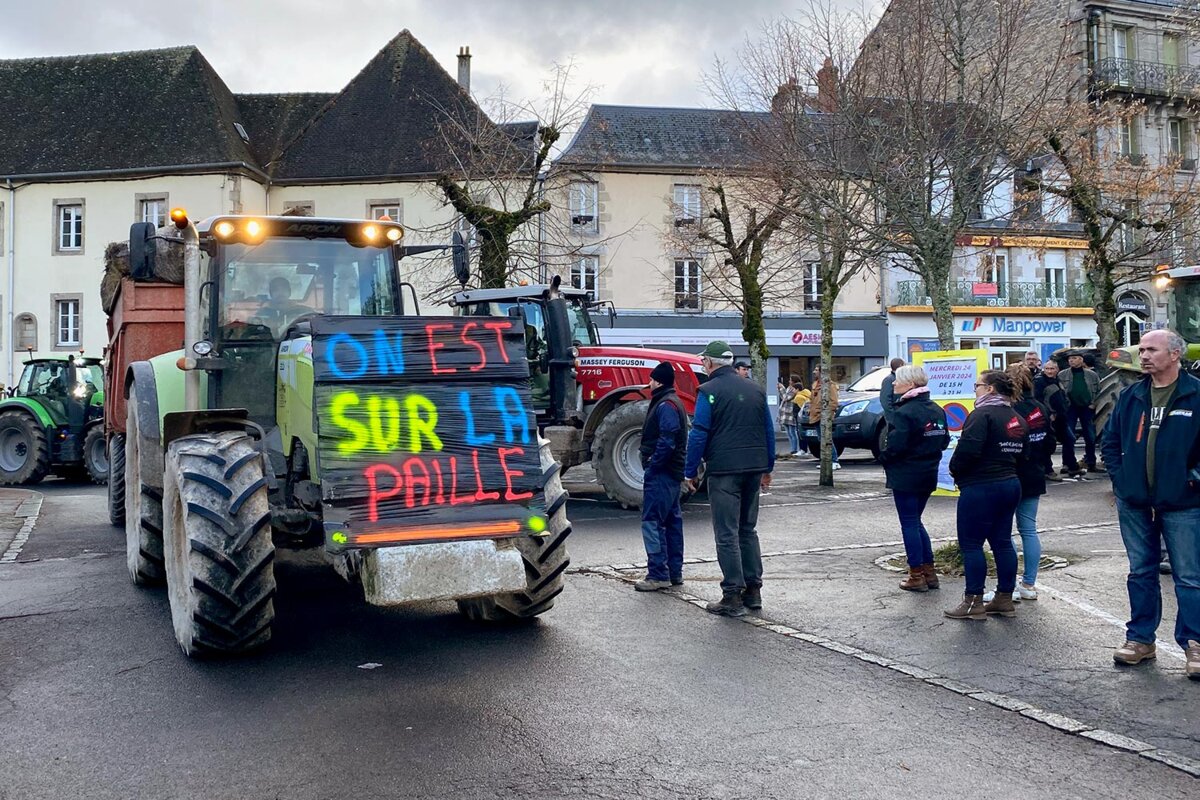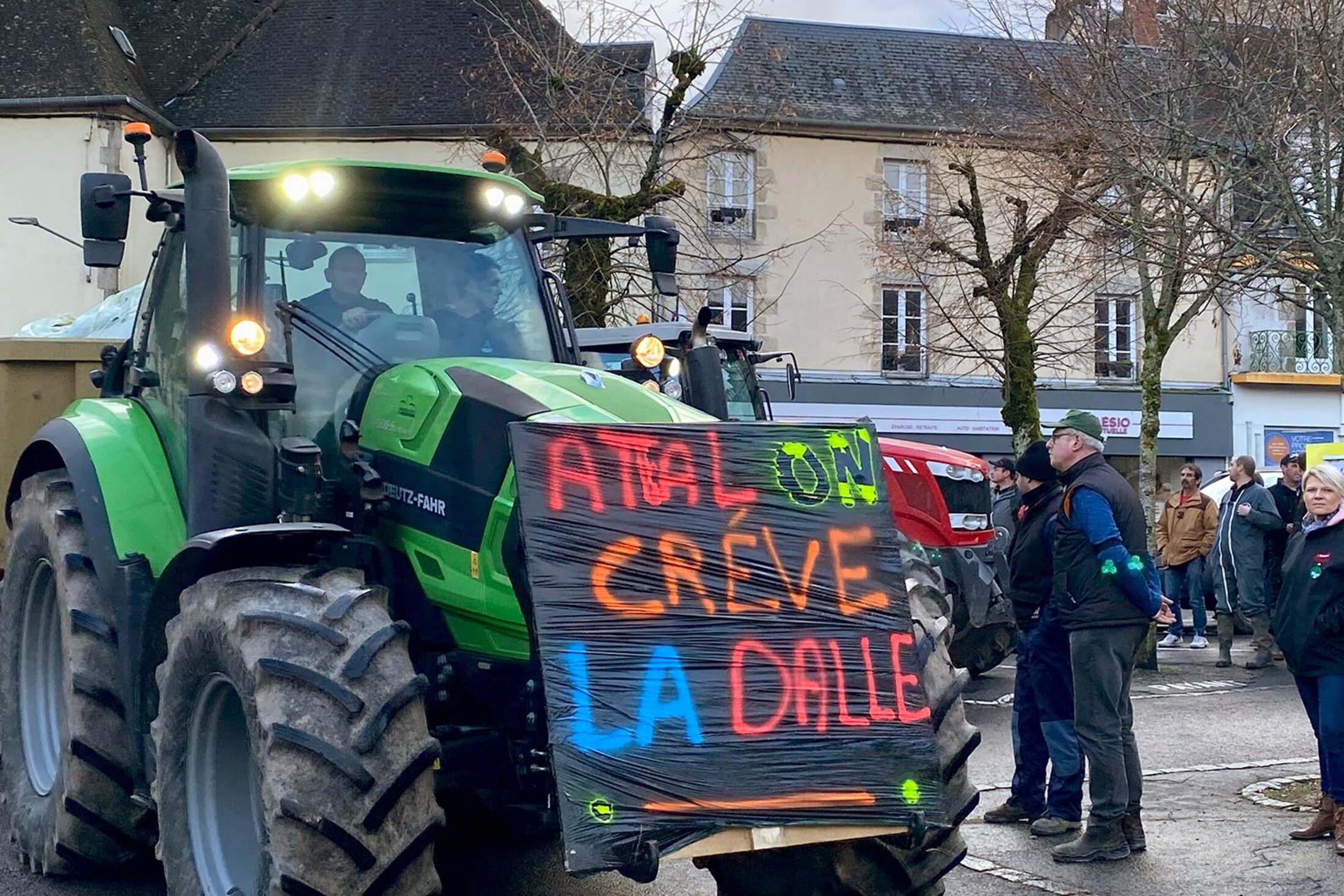It was shortly after mid-afternoon on Wednesday when around 270 tractors, honking their horns, rumbled at low speed through the streets of Guéret, a small town situated in the Creuse département (county) in central France. They had come from various rallying points in the surrounding villages to converge on the central square, situated between the local prefecture building and the Guéret town hall.
For months now, anger and frustration has been simmering among France’s farmers over a catalogue of grievances, including the administrative bureaucracy they have to deal with, the cost of diesel fuel, problems with access to water in those regions most affected by a series of record-breaking droughts, the requirements of environmental protection regulations, and the loss of their share of the domestic market due to imports resulting from free-trade agreements. Having finally spilled over into open revolt, beginning last week with roadblocks in the south-west of the country, their protest movement appears to be growing by the day.
The demonstration in Quéret was called for by a local branch of the national federation of farmers’ unions (the FDSEA), one of the largest representative bodies of farmers at a national level, and another union, the Jeunes Agriculteurs (JA), which represents young farmers.
Even farmers’ union officials were surprised by the size of the turnout in Guéret. On Wednesday morning, the head of the Creuse branch of the FDSEA, Christian Arvis, told local radio station France Bleu Creuse that he expected up to 80 tractors would join the protest, whereas more than three times that number showed up.

Enlargement : Illustration 1

Many of the giant machines carried panels with slogans colourfully daubed in fluorescent paint, often with a clever rhyming play on words in French, but with ominous undertones. Notre fin sera votre faim read one (meaning “Our end will be your hunger”, the words “end” and “hunger” being pronounced the same in French); Éleveur? Petit on en rêve. Grand on en crève (“Stockbreeder? When little we dream of it. Adult we die of it”). Another addressed France’s new prime minister, Gabriel Attal – Attal on crève la dalle (“Attal we’re starving”).
It's been boiling for a long time
The day before the show of force, the deaths were announced on Tuesday of a 37-year-old woman livestock farmer and her 12-year-old daughter after they were hit by a car, in an apparent accident, as they manned a protest roadblock in south-west France. The father of the family was left seriously injured. “Their deaths must not be allowed to have been for nothing,” said Éric Montlaron, a farmer and FDSEA official from Saint-Dizier-Leyrenne, a village some 20 kilometres south-west of Quéret. “If the family had travelled to the roadblock, it’s that things must be very bad. Everyone must come, France is going to wake up at last.”
Brice Simonet, 32, a livestock farmer and member of the JA union, had travelled more than 60 kilometres on his tractor to reach Guéret on Wednesday. “There are colleagues who are not members of any union and who have followed the movement,” he commented. Simonet, like others present at Wednesday’s protest, spoke of the profound malaise among farmers, surviving on modest incomes and who feel abandoned by government. “It’s been boiling for a long time,” he said, recalling that in November last year, farmers had protested over the delays in receiving EU subsidies, but that no notice was taken. “As long as there are no clear announcements made [by the government], it’s not going to stop.”
Between now and 2030, around 50% of France’s currently active farmers will reach retirement age. “It’s going to be catastrophic in some ten years’ time, there’ll be half as many farmers,” commented Simonet, adding that the result is often the abandoning of farmland, or its transformation into larger farms. “There must be respect shown towards the previous generations, but instead, what they’ve achieved is left to nothing.”
I would prefer that we receive less aid and that we live truly from our profession
The mayor of Guéret, Marie-Françoise Fournier, looked on as the tractors passed, some of them loaded with manure which they later dumped in front of a police cordon that was set up to bar access to the prefecture. “It’s staggering, 270 tractors – it’s a sign that something is very wrong,” she commented. “They produce an agriculture of quality here, but they suffer from the competition of inferior imported products. I sense the agricultural world is in total burnout. We’ve reached the end of the line. There needs to be listening. If they are not heard with what they’ve demonstrated, what will be the other choice?”
Many of those questioned by Mediapart spoke of their derisory income. Daniel Peyrot, 60, runs a dairy farm with a herd of 350 cows, situated on the plateau de Millevaches in this region of central France. He said his monthly income is 1,200 euros, and that he had had to take out loans to be where he is today, owner of 250 hectares of land and his herd. He complained of the requirements of agricultural standards imposed on farmers, notably those concerning environmental protection which involve surveillance by satellite images.
“I would prefer that we receive less aid and that we live truly from our profession,” said Peyrot. “The more that we are paid, the more that we would take care of the environment. We know that the land is nourishing.”
Despite it all, he said he remains passionate about his occupation, and that he, a farmer’s son, had transmitted that passion to his own children.

Enlargement : Illustration 2

Peyrot is also concerned at the decline in the numbers of farmers and, in parallel, the difficulties for those who want to take up farming in face of the price of land and the required investment in equipment. “In the Creuse, we’ve lost 5,000 cows in 2022, and 42,000 over seven years,” he said.
Some of the tractors in Guéret hung dummies dressed in the typical boots and overalls of farmers to underline the high number of suicides among the profession. “The ill-being among farmers pushes them to suicide, but it comes also from depression, dysfunctional family life,” said Pierre Couret, a breeder of sheep and Limousine cattle. “It’s a job of passion, and the dream is broken because one can’t live from it,” added Couret, member of a small union representing family-run farms, the MODEF.
My father receives a [monthly] pension of 800 euros after 44 years in the profession
It is unclear what the revolt will lead to, and whether it might widen to include issues like the provision of public services in rural areas. The government fears a repetition of the “yellow vest” movement that erupted in 2018, when what began as a protest against a hike in taxes on fuel snowballed into unstructured, anti-government demonstrations across the country over a range of social grievances. While Mediapart spotted only one demonstrator in Guéret on Wednesday wearing the high-viz yellow jacket that gave the 2018 movement its name, the general atmosphere was clearly one of distrust towards the political powers in general.
Bruno Faury, 34, a member of the JA union, is a livestock farmer also from Saint-Dizier-Leyrenne who joined the demonstration in Guéret. “If all the farmers are demonstrating in Europe, it’s because there’s a problem with taxes,” he commented. “The [EU] free-trade treaties are rebounding against us. We try to make good of our terroir, but it’s not easy. My father receives a [monthly] pension of 800 euros after 44 years in the [farming] profession, holidays are rare and politicians make promises but don’t do anything.”
On Wednesday evening, a pile of manure was dumped in front of the constituency office of the local Member of Parliament, Catherine Couturier, from the radical-left La France insoumise (France Unbowed) party. Not far from there, black smoke rose into the sky from a roadblock set up by farmers in the village of La Croisière.
-------------------------
- The original French version of this report can be found here.
English version by Graham Tearse


